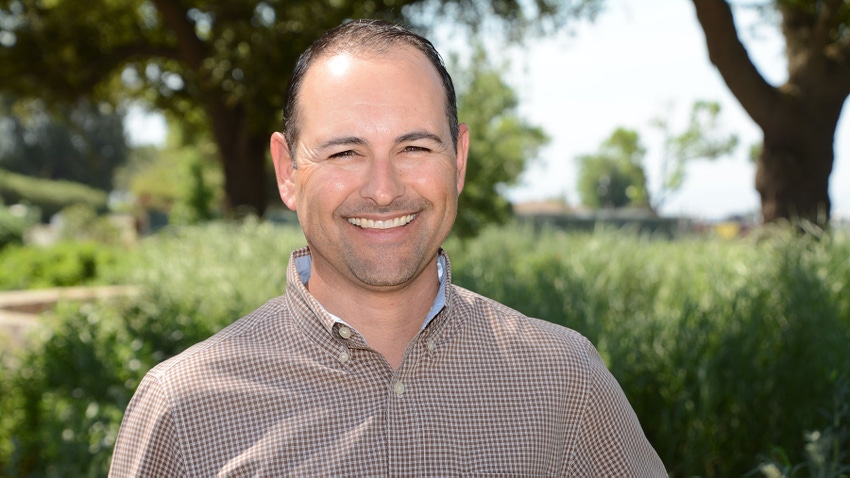
This is part one in a five part series.
U.S. farms grow more professional with each new generation, but you’d never know it from asking a typical city dweller.
“Farmers are more than just slow moving inhabitants of rural landscapes,” jokes Derek Azevedo. “One of the greatest backhand compliments we get is when people come here and say, ‘You know, you run this farm like a business!’”
“Here” is Bowles Farming Co., a respected 11,900-acre specialty crop farm near Los Banos, CA., with 60 full-time employees that swells to 500 or more each summer. Azevedo is Executive vice president and Chief Operations Officer, keeping a close eye on consumer engagement and employee, business, and process management. Each of these is a critical success driver at Bowles, led by CEO Cannon Michael.
We asked Azevedo to share not only his take on farming’s toughest challenges, but also what the future might hold in a wide-ranging five-part series that touches on everything from employee management to climate change. Watch for new segments each day this week.
How do you describe the differences between specialty and commodity crop farming when you talk with your friends in row crop country? How do those differences impact your job as Chief operations officer?
We’re closer to the consumer. The consumer is asking for stuff that tastes better, is healthier, and is more local.
That puts more complexity into our business. If you look at ag over the last 100 years, it’s all about scaling up – more acres, less time, lower costs. But we’re getting into a time now, where the challenge we’re bumping in to is scaling down. We’re getting demand for more varietals, more granular, more specific attributes; You don’t just buy cinnamon in the grocery, it’s a choice between different kinds of cinnamon, for example.
When you just farm cotton, alfalfa and barley, the equipment plan is easy; the core competency needs for employees is straightforward. But when you farm a diverse mix of row crops grown at different times of the year, you ask for your people to be more dynamic, your equipment to be nimbler, and you start to value smaller tractors that can do more things instead of just a big horsepower tractor that covers a lot of ground.
This kind of farming is more fun, but it’s really forced me to do more planning. Each year I spend countless hours working on the next two crop plans. I need to know previous crop in each field, and the next crop in each field to properly maintain our crop rotation. We have to have a longer-term look at things.
How does being closer to the consumer impact what happens on the farm?
We don’t sell to elevators; we sell to crop buyers. We’ve tried to recognize what consumers are asking for, and craft the farm in that image a bit before the crop buyers come to us. They are looking for attributes that differentiate our business from others. We have documented the individual species of birds on the farm, we started a native seed company; we restored degraded habitats, we use solar to offset electricity demand; we use drip irrigation to conserve water; we invest in leadership training and scholarships for our employees; and it goes on and on.
We’ve invested in all of these things because we believe consumers care, and that we’re going to be compensated for all that activity. We try to do more than others – better flavor, safety, transparency - and we expect to get paid for it.
We’re looking ahead. In 2018 we started the Great Valley Seed company, with local ecologists. We have 250 acres of native plants. Why? In effect the state of California has put a noose on surface water rights and allocations; they’ve also curtailed groundwater pumping. So about half to 1 million acres of ground will be pulled out of production in the next 20 years. That’s a big deal. Restoration by abandonment is a bad strategy, but that’s why we started a native seed company. We’re the only native seed company south of the Delta in the San Joaquin valley that provides local types of arid California native plants, which could potentially restore some of that retired land to valuable habitat. It’s a bit of a gamble, but it’s also meaningful work.
We’re potentially dealing with the most insecure consumer ever. Sometimes people look for a higher priced product, to validate quality; brand loyalty has been replaced by 5-star reviews. We seem to be moving away from the habits of price-focused baby boomers, and into purchase signals that consumers want food to provide more than nutritional needs. Consumers want their food to tell a story.
Azevedo will be part of a panel discussion on AI at the upcoming Organic Growers Summit, Nov. 29-30 at Monterey, CA. Register at https://www.organicgrowersummit.com/
Read more from this series:
About the Author(s)
You May Also Like






